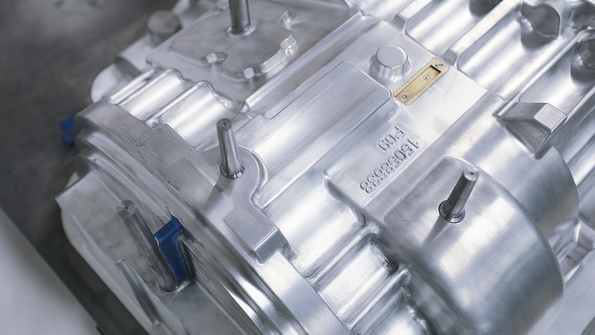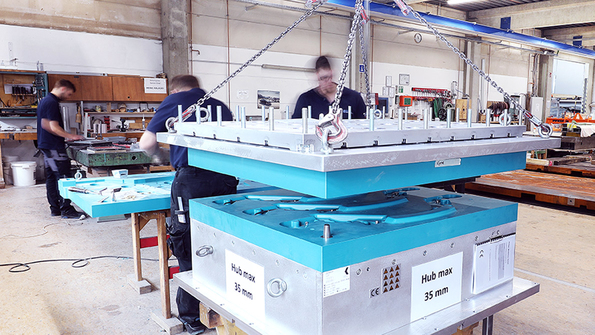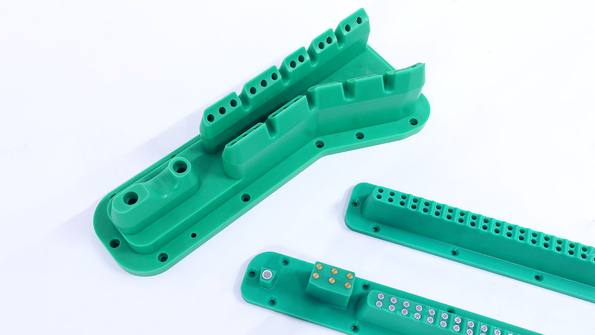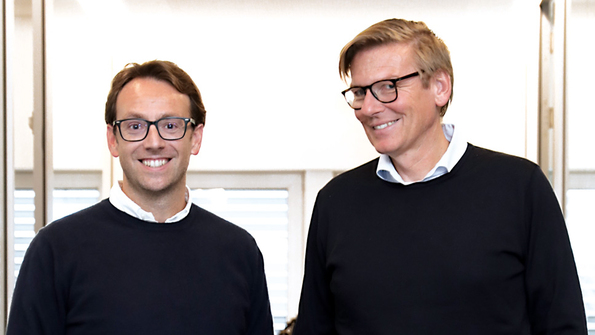
-

The path to the future: Developing principles for die, model and mold manufacturing companies
Tebis Consulting at Krieger Modellbau GmbH
Company
Krieger Modellbau GmbH, Aalen, Germany
Focus
Model, die and fixture manufacturing
Published
2021

Interviewee: Dominik and Florian Krieger, Managing Directors
About ten years ago, the sports world was swept by a new phenomenon. Many soccer clubs and others developed their team principles and made them public. The purpose was to show fans and players what the club stood for – including specific values and traditions – and to enhance their loyalty to the club. These principles were also a means of influencing public perception of the club and acquiring sponsors. This practice of corporate development and communications has established itself in sports and is ongoing. The situation is quite different in die and mold manufacturing: "Approximately 25 percent of the roughly 4,000 companies in our industry have written principles," Jens Lüdtke estimates. The trained industrial mechanic with a degree in Mechanical Engineering is head of Tebis Consulting, an independent business area of Tebis AG specializing in die, model and mold manufacturing and production machining. In addition to other services, the team of six consultants also is responsible for the preparation of the company’s principles in its portfolio.
 Supported by two apprentices, master model-maker Helmut Krieger founded his company in Oberkochen, Germany, in 1973. Today the family business has its headquarters in Aalen, boasts roughly 40 employees, and has trained its own apprentices since the founding of the company.
Supported by two apprentices, master model-maker Helmut Krieger founded his company in Oberkochen, Germany, in 1973. Today the family business has its headquarters in Aalen, boasts roughly 40 employees, and has trained its own apprentices since the founding of the company.Corporate principles as the foundation for realizing visions
 Brothers and Managing Directors Florian and Dominik have managed the company in its second generation since 2002. "The quality of the end product is absolutely critical to us": Dominik stresses the desire to manufacture models, fixtures, molds and dies that guarantee smooth production processes. Guiding customers through the entire process chain from a service perspective is an additional focal area in the corporate philosophy.We cut to Krieger Modellbau in Aalen, where Managing Directors Dominik and Florian Krieger work with Tebis Consulting to fine-tune a long-term strategy for their company. "The idea developed from the desire to continuously ask ourselves constructive questions and reflect on them," Dominik explains. The vision for the next five to ten years is now for Krieger Modellbau to become a networked digital die manufacturer. The development of principles is a key step in this process. "We wanted to develop a guideline for day-to-day practices in our work that shows all participants a uniform path to the future," Florian adds. "In discussions with Tebis Consulting, it became clear to us that this would lay a foundation on which we can continually develop the company."
Brothers and Managing Directors Florian and Dominik have managed the company in its second generation since 2002. "The quality of the end product is absolutely critical to us": Dominik stresses the desire to manufacture models, fixtures, molds and dies that guarantee smooth production processes. Guiding customers through the entire process chain from a service perspective is an additional focal area in the corporate philosophy.We cut to Krieger Modellbau in Aalen, where Managing Directors Dominik and Florian Krieger work with Tebis Consulting to fine-tune a long-term strategy for their company. "The idea developed from the desire to continuously ask ourselves constructive questions and reflect on them," Dominik explains. The vision for the next five to ten years is now for Krieger Modellbau to become a networked digital die manufacturer. The development of principles is a key step in this process. "We wanted to develop a guideline for day-to-day practices in our work that shows all participants a uniform path to the future," Florian adds. "In discussions with Tebis Consulting, it became clear to us that this would lay a foundation on which we can continually develop the company."
The experts from Tebis Consulting estimate a time of eight to ten work-days to develop principles, divided over a period of two to three months. According to Lüdtke, the principles of a company are determined by three factors: "On the one hand we have the vision, the mission, the values and the employee interests, and on the other we have the company strategy that’s derived from them. There’s also the question of the business model: Where do I see my markets in the future, and where do I want to be involved?" Lüdtke stresses how important it is to include the employees in these considerations in order to reflect the full spectrum of the company. An anonymized employee survey is therefore a fixed element in the development of corporate principles.The need for an outside perspective: moderation and guidance through processes
Florian reports: "We formed a six-man team from corporate management and second-level management, and Burak Beklenoglu from Tebis Consulting guided us and moderated the process . We worked together to develop the survey and to evaluate the responses." Beklenoglu, who has already developed principles with several other companies, describes this process as extremely valuable: "The framework comes from corporate management, and the interesting fine-tuning is then based on input from employees: This feedback often gives us highly unexpected but especially in-depth insights into the corporate culture," reports Beklenoglu, a project manager with more than 15 years of experience in market analysis, business development and consulting in market positioning. It’s critical that the employees receive the results of the survey so they’ll understand exactly how the principles were developed.
Krieger Modellbau has recorded its principles in a mind map where the company's values and characteristics are structured and summarized in compact form. The formulation of and insights from the maps are already having an impact: for example, internally in the family company's personnel management. "No hire and fire: Our parents already exemplified this," says Dominik. This is an approach that’s been taken to a completely new level in the company: "For example, we encourage our specialists to study in parallel with their work and in general to participate in ongoing training. Employees should be able to optimally develop themselves in our company. We’ve expressed this perspective in the principles project with the formulation: A workplace for life."
 Krieger's customers include companies in the aerospace, foundry and automotive industries throughout Europe. Other customers come from drive and power engineering and the consumer goods industry.
Krieger's customers include companies in the aerospace, foundry and automotive industries throughout Europe. Other customers come from drive and power engineering and the consumer goods industry.Both inward and outward effects
A distinctive and memorable motto like this has both internal and external effects. Dominik's brother Florian illustrates the relationship between the individual maturing process of developing the principles and the impact on a company’s outward image: "Developing our principles strengthened me in my personal development. It was an extremely complex process, but after a few months you can say to yourself: In the past, I would have held this customer meeting in a completely different way. We’ve since become calmer, more prudent and more confident, and we all follow a common strategy. I believe that this is perceived by investors, suppliers and customers." And if you use them cleverly, he says, principles can become a true competitive advantage.
Corporate principles help the industry
But are principles really necessary for every die, model and mold manufacturing or production machining company? The Managing Directors at Krieger are so convinced of this that they’re making an offer to industrial companies. "We warmly welcome anyone who wants to know more about how we developed our principles to discuss it with us," Florian Krieger explains. "Because despite the current competitive atmosphere, companies that supply high-tech should draw much closer together and help each other out – especially considering the internationalization in the die, model and mold manufacturing industry. We’d all sleep easier." By the way, this openness is also documented in the Krieger mind map. Because Dominik and Florian are very sure of one thing: If you have principles, you should live according to them, otherwise they’re no benefit. It's the same in soccer: Publishing a motto on the club website is one thing, but there’s only a long-term gain if you actually work as a team and pursue these higher values is there any long-term gain!
Developing our principles strengthened me in my personal development. This was an extremely complex process, but after a few months you can say to yourself: In the past, I would’ve held this customer meeting in a completely different way. We’ve since become calmer, more prudent and more confident, and we all follow a common strategy.Florian Krieger, Managing Director, Krieger Modellbau
